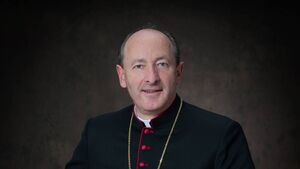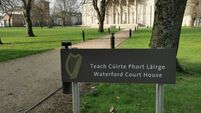Waterford's new Sunday funeral guidelines explained

Most Rev. Alphonsus Cullinan, Bishop of the Diocese of Waterford and Lismore.
Parishioners in the Diocese of Waterford and Lismore has been issued a letter from Bishop Alphonsus Cullinan regarding a new general norm to avoid the celebration of funeral Masses on Sundays.
This decision follows discussion at a recent meeting of the Senate of Priests, where clergy shared their growing difficulty in managing the pastoral and liturgical demands of Sunday funerals.
The Diocese held 1,176 funerals in 2024, "underscoring the significant workload borne by parish clergy, particularly over weekends when Sunday Masses, baptisms, and other responsibilities are already scheduled" the Bishop's letter stated.
The new guideline encourages that, as a general rule, funerals should not take place on Sundays.
However, Bishop Cullinan said that exceptional pastoral circumstances, such as cemetery closures, may warrant flexibility.
Bishop Cullinan also noted that many parishes have already adopted a policy of not scheduling Sunday funerals and expressed his hope that the faithful will understand the pastoral and practical reasons behind this new diocesan norm.
He said, "Of late, priests have found it increasingly difficult to cover funerals on Sundays. At a recent meeting of the senate of Priests of the Diocese, it was decided that, as a general rule, Sunday funerals should be avoided across the Diocese.
“However, a particular cemetery may be closed on Mondays, which presents a unique problem for a funeral on Mondays. Therefore, while this is to become a definite norm there may be exceptions for pastoral reasons.”
Bishop Cullinan added that many parishes have already made it parish policy not to have Sunday funerals.
“If we had more priests, bereaved families could be accommodated on Sundays but as we do not have a surplus of priests,” he said, “we must not over burden the priests who minister in our parishes.
“I hope that you can see the wisdom of the reasons given above for the creation of this general norm.”
The main reasons cited for this change include the impact on regular Sunday Mass-goers, who may feel a funeral is being added to or overshadowing the normal liturgy.
Bishop Cullinan said in a letter to parishioners, that it is “not fair on the usual congregation who come to Sunday mass and may feel a funeral is being imposed on them".
Also cited as a reason for the decision is the difficulty of giving a homily that appropriately reflects both the Sunday readings and the funeral context, and overcrowding in churches and the risk of a family's bereavement being diminished within the larger Sunday celebration.
“The family of the deceased often feel their bereavement is somewhat lost in the celebration of the parish Sunday Mass," Bishop Cullinan said.
The added strain on clergy already committed to multiple Sunday Masses and other sacraments and the current shortage of priests in the diocese also influenced the recent decision.
“Having a funeral puts extra pressure on the priest," the Bishop said.
"It involves more preparation and energy. This is on top of the preparation for two or three Sunday masses and perhaps baptisms, which had been arranged for after Sunday mass, then have to be rearranged, therefore discommoding those families.”
"These problems are all avoided if the funeral mass takes place on any of the other six days and not on Sunday," Bishop Cullinane added in his letter.
There are ongoing concerns in the diocese and indeed across the country regarding the falling numbers of priests.
Just months ago, Mount Melleray monks vacated Waterford, owing to falling numbers.
"We have been confronted with these difficult decisions as we address the reality of falling numbers and ageing communities; issues which other similar communities are also addressing at this time," a circulated letter said.
Also in the past year, parishioners were invited to meetings on how best to respond to the current crisis due to the shortage of vocations and the ageing clergy.
In a previously circulated letter, Bishop Cullinan suggested some options, such as reducing the number of Masses, the closing of churches or amalgamating parishes.
"Our Pastoral Council is hoping to broaden the scope of the consultation, seeing the crisis as an opportunity to encourage greater lay participation in ministry and leadership in our parish. We believe that the Lord gives the Church everything we need to fulfil the ministry he has given us. We have an opportunity now to explore new ways of being Church," a newsletter from the Parish of St Joseph & St Benildus & St Mary previously said, whilst imploring parishioners to attend meetings to form new solutions.
Meanwhile, a letter circulated by Fr. Ned Hassett last year said, "We are all concerned about a more beautiful and meaningful celebration of the Eucharist. With the decline in the number of priests and priests’ age and health, the current Mass schedule cannot be sustained."






